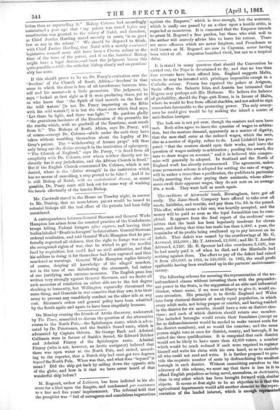If this should prove to ba so, Dr. Pusey's exultation
over the freedom' of the Church of South Africa—' freedom' in that sense in which the slave is free of all interference between him- self and his master—is a little premature. The judgment, he says, "looked at first sight as if it were producing chaos, yet to us who know that 'the Spirit of God moveth on the face of the wild waters' [is not Dr. Pusey improving on the Bible with his wild waters?] it is but the chaos over which God says, 'Let there be light, and there was light." He pardons gladly "the gratuitous insolence of the Erastianism of the preamble for the results which, with no goodwill of the Erastians, must result from it." The Bishops of South Africa, says Dr. Piney, will of course—except Dr. Colenso--abide under the oath they have taken without troubling themselves about the legality of Dr. Gray's patent. The "withdrawing of human props" will thus only bring out the divine strength in the institution of episcopacy. "The Church of England," says Dr. Pusey, "is freed from all complicity with Dr. Colenso, over whom neither directly nor in- directly has it any jurisdiction, and the African Church is freed." But if the English Church consecrated Dr. Colenso, which is not denied, where is the divine strength' in the institution which has no means of cancelling. a step proved to be false ? And if he is still Bishop of Natal, with an ecclesiastical diocese, as seems possible, Dr. Pusey must still look out for some way of washing his hands effectually of the heretic Bishop.






























 Previous page
Previous page